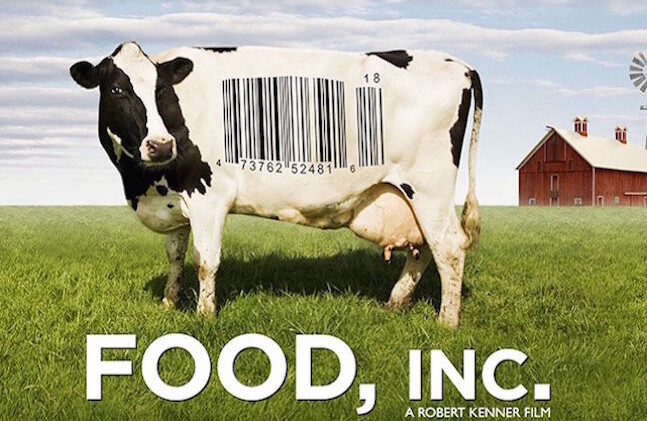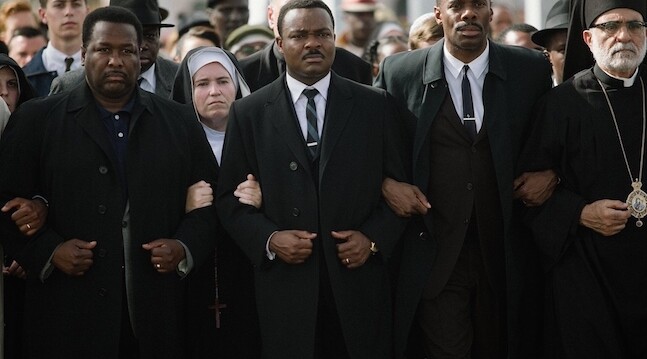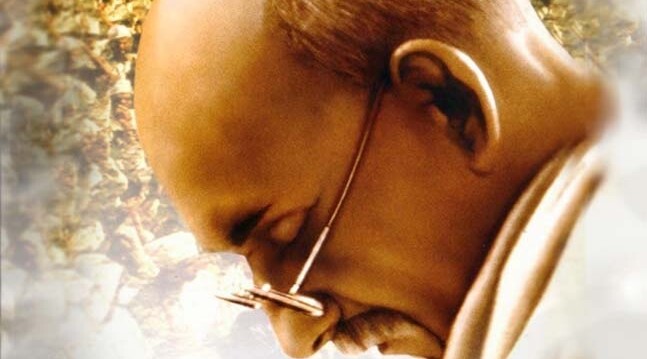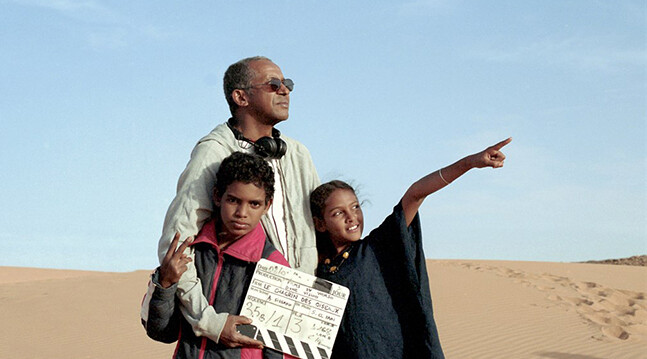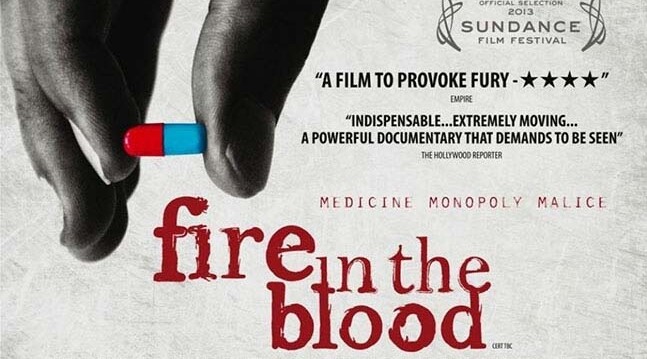Brief Overview
Food, Inc. takes a look at the U.S. food industry and examines how what we eat gets from the seed or animal to our table. Directed by Robert Kenner, this documentary explores farms around the country, both large and small, meat and vegetable. It reveals different practices in the food industry, with some farmers and company owners looking at food as something to be manufactured scientifically, while others see it as a product of nature. Throughout the film, the audience is urged to question whether mass-produced food is environmentally and socially sustainable.
Food, Inc. also criticizes the role of the U.S. government in skewing prices lower for unhealthy foods through subsidies for corn. These subsidies bring down the cost of processed foods made with high-fructose corn syrup and other corn-based products and make the market less competitive for other foods. In addition, it exposes the close relationships between FDA (Food and Drug Administration) and USDA (U.S. Department of Agriculture) regulators and major food companies. One example is Supreme Court Justice Clarence Thomas's former position as an attorney for Monsanto Chemical Company (1976-1979) and his 2001 vote in favor of Monsanto in a case where the giant corporation sued a farmer for allegedly violating a licensing agreement that forbade him to replicate Monsanto seeds. Monstanto won the case. (Note that the film overstates the conflict of interest by claiming that Thomas wrote the opinion supporting Monsanto; it was actually written by Justice Elena Kagan. Nevertheless, a conflict of interest certainly exists.
Kenner emphasizes that is up to the consumer to pressure companies to start including more information on their labels and offering organic choices. Such lobbying can make a difference. There are examples of large retailers like Walmart choosing healthier options for dairy products based upon consumer preferences.
The Cost of Cheapness
One of the major themes in Food, Inc. is the hidden costs of cheap food. It argues that mass-produced, "engineered," low-price foods come with health, social, and environmental costs. On the health costs, the point is raised through the stories of two families. In one, Patricia Buck's two-year old son died of an E-coli strain after eating a fast food Jack-In-The-Box hamburger while on vacation. Afterwards, Buck campaigned for Kevin's Law, which would give the USDA power to shut down meat processing plants that produce contaminated meat. The law did not pass but parts of it were included six years later in the FDA Food Modernization Safety Act of 2010.
The second example of hidden costs of cheap food is told through the story of a family who cannot afford a healthy diet. Instead, they frequently eat fast food because it is the most filling option at the lowest price. Because of this, the father now has Type 2 diabetes and the family spends around $200 per month on his medicines. At the end of the segment, the film shows the statistic that "one in three Americans born after 2000 will contract early onset diabetes."
Our cheap food also comes at great social cost. Food, Inc. has a segment about illegal immigrants who are employed at meat processing facilities in the United States; because of their vulnerable status, they are afraid to protest against their unsanitary working conditions. This labor practice was common in the meat industry at the beginning of the 20th century. Upton Sinclair wrote about it in his 1906 muckraking novel The Jungle, which brought about a reaction that helped make these plants safer places with more workers' rights. The film notes that this is what happened in the auto industry as well. Meat processing plants, however, have reverted back to unfair treatment of workers, and today's conditions are arguably similar to those of over 100 years ago, according to Kenner.
Finally, the environmental cost that comes with mass-produced foods can be seen through the petroleum-based pesticides and fertilizers that are used in farming. Food, Inc. also states that it takes 75 gallons of oil to bring a steer to slaughter. Another common theme throughout the film is the debate between engineered science and nature, which questions practices such as using ammonia to kill bacteria inside meat rather than feeding cows grass, which naturally kills those bacteria.
Discussion Questions
1. The film states, "At the turn of the century, a farmer could produce enough food for six to eight people. Now the average American farmer can feed 126 people." Should food technology be seen as a positive thing because we can now feed more people at lower prices? Or are the health, social, and environmental costs too high for processed food to continue to be a major part of the American diet?
2. The film shows the mostly immigrant population that works in the meat processing facility and the conditions that they work in. This is compared to the early 1900s, where it was also a mostly immigrant population working in meatpacking plants in hazardous conditions. Do you think labor practices in the meat industry have improved since then? Why or why not? If you have read or are familiar with Upton Sinclair's The Jungle, it may be used as a good reference. What do you think can be done to improve working conditions in these meat plants today?
3. Do you think the power to create more ethical practices in the food industry lies with the consumer? Why or why not? The film argues that we can make choices in what we buy, but some people cannot afford choices, such as the family shown eating at the fast food chain. What can they do to enact change?
4. Do you think it is ethical for those who have been involved with the food industry to go on to influence or implement food policies?
5. After watching this film, what changes, if any, do you want to see made to the food industry? Who do you want to see drive the change? The consumer, the government, the producer or the supermarkets/retailers? Why
6. The film makes a comparison between food companies that promote unhealthy foods and the tobacco industry. Do you agree with this assessment? Why or why not?
Subscribe to the Carnegie Ethics Newsletter
Selected Carnegie Council Resources
Hold the Salmon, How About Scup? For Sustainable Seafood, Variety is Key: Amrita Gupta, Carnegie Council
Atlantic salmon and blue fin tuna have been overfished nearly to extinction and farmed fish come with concerns such as the overuse of antibiotics. Yet there are hundreds of delicious and sustainable fish like mullet, dogfish, and scup, species often referred to as "trash fish." For sustainable seafood, let's be more adventurous and try fish like scup. (Article, August 2016)
From Lab to Table: Gilonne d'Origny, New Harvest; Irene Pedruelo, Carnegie Council
New Harvest wants to kick-start a bio-economy of animal products made without animals. Some have already called this revolution "the next .com." (Policy Innovations interview, December 2015)
Fighting Obesity Requires a Choice: Profit or Public Health? Roberto De Vogli and Noemi Renzetti, University of California Davis
Unless governments take steps to promote healthy diets and discourage consumption of ultra-processed products, chances to stop and reverse the obesity epidemic remain quite slim. (Policy Innovations article, October 2015)
Big Soda Politics - A Call To Advocacy: Marion Nestle, New York University
It is becoming evident that Big Soda copies the playbook used by Big Tobacco to distract people from the harm caused by cigarette smoking. Although falling soda sales are the results of successful advocacy, there is still a lot of work to do. (Policy Innovations article, October 2015)
How Much More Processed Food Can We Eat? Tim Lobstein, World Obesity Federation
Food policies for the 21st century will be about the purpose of markets and the need to hold marketers to account for their activities. (Policy Innovations article, October 2015)
Global Ethics Day: Feeding the Planet: Gerald Bourke, World Food Programme; Gilonne d'Origny, New Harvest; Jessica Fanzo, Johns Hopkins Berman Institute of Bioethics and Nitze School of Advanced International Studies
There are roughly 2 billion people who are under-nourished and another 2 billion who are overweight or obese. In other words, about half the world's population is malnourished. How can we feed the world ethically, sustainably, and well? This panel provides some answers, from food aid to producing milk and meat in cell cultures. (Global Ethics Network, October 2015. Video, audio, and transcript.)
The Next Pig Idea: Tristram Stuart, Food Waste Campaigner; Irene Pedruelo, Carnegie Council
Food waste expert and environmentalist, Tristram Stuart, has had an unexpectedly big idea that could change the world. (Policy Innovations interview, June 2015)
Full Planet, Empty Plates: Lester R. Brown and Janet Larsen, Earth Policy Institute
"We are in transition today from an age of surpluses to an age of scarcity," says Lester Brown. The reasons are manifold: population growth; climate change; water scarcity; a substantial part of the U.S. grain harvest being used for fuel; increased demands because of rising affluence; and a glass ceiling for crop yields. (Public Affairs, May 2015. Video, audio, and transcript)
Soy is a Huge Cloud Over All Agriculture: Kathryn Redford, Ofbug; Irene Pedruelo, Carnegie Council
Kathryn Redford has a mission: revolutionize the meat industry. How? By using insects in animal feed, instead of soy or corn. (Policy Innovations interview, January 2015)
Why Isn't Food a Public Good? Jose Luis Vivero Pol, Université Catholique de Louvain
What would the world look like if we were to treat food as a public good or commons and not merely as a commodity? (Policy Innovations article, September 2014)
Food for Peace?
Food for Peace, which ships American farm products to developing nations, has long been criticized for crowding out local agriculture. Now, to the dismay of the U.S. farming and shipping industries, President Obama is proposing sending nations cash grants. Is "Cash for Peace" a better idea? (Global Ethics Corner, May 2013. Video, audio, text.)
Not Enough Fish in the Sea?
Marine fish stocks are dangerously low, but this hasn't stopped China from sending its fishing fleets to distant waters, sometimes illegally. Could China's insatiable appetite for seafood be a threat to the world's fisheries? Is there more we should be worried about? (Global Ethics Corner, January 2013. Video, audio, text.)
Is Local Food More Ethical?
With real economic benefits and perceived environmental ones, local food has been branded as an ethical alternative to the mass-produced variety. But critics point out that locavores forget crucial points about climate change and global poverty. Is local food really more moral? (Global Ethics Corner, October 2012. Video, audio, text.)
The Race for What's Left: The Global Scramble for the World's Last Resources: Michael T. Klare, Hampshire College
As we run out of resources, the human race is at a pivotal point. We have two options: We can continue along the same path, leading to much of the planet becoming uninhabitable. Or we can create an alternative future where we use resources in a much more sustainable and frugal way. (Public Affairs, March 2012. Video, audio, and transcript)
The (Ethical) Taste of Success: Ashok Vasudevan, Tasty Bite; Julia Taylor-Kennedy, Carnegie Council
Ashok Vasudevan has what it takes to build commercially viable and socially responsible global companies. Tasty Bite, an all-natural, ready-to-eat food sold in the U.S. and Australia, is ranked one of India's "Top-100 Best Companies to Work For." (Just Business, June 2011. Audio, transcript.)
